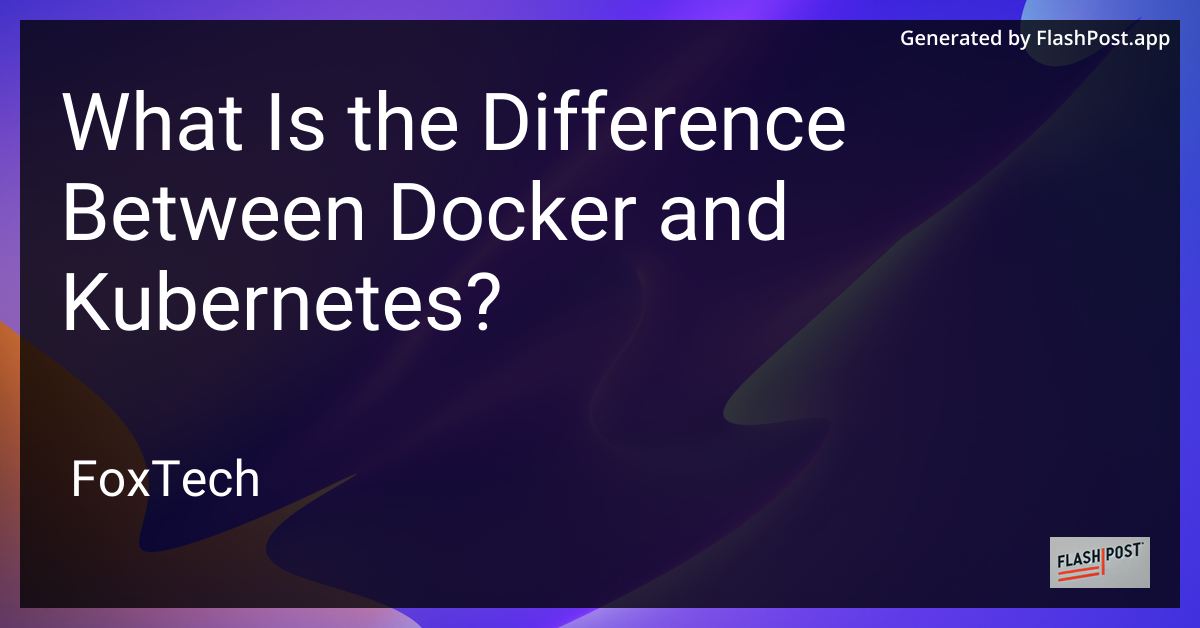
In the rapidly evolving world of software development, Docker and Kubernetes have emerged as two pivotal technologies that streamline the application deployment process. Although they are frequently used together, they serve distinct purposes and have unique functionalities. This article highlights the fundamental differences between Docker and Kubernetes, helping you to understand how they contribute to modern software architecture.
What is Docker?
Docker is a platform designed to create, deploy, and manage containers—the lightweight, executable packages of software that include everything needed to run an application. With Docker, developers can encapsulate their applications into containers, ensuring consistency across different environments. This enhances the development workflow by minimizing the "it works on my machine" problem, making it an invaluable tool for developers.
Key Features of Docker
- Containerization: Docker simplifies the creation and management of containers, allowing applications to run consistently on any system.
- Portability: With Docker, you can move containers easily across different environments, such as from development to production, ensuring seamless integration.
- Efficiency: Docker's containerization reduces overhead and accelerates the software development lifecycle.
What is Kubernetes?
Kubernetes is an open-source platform designed for automating the deployment, scaling, and operation of application containers. Originally developed by Google, Kubernetes offers a robust environment for running distributed systems resiliently. It provides tools for deploying applications, scaling as needed, managing changes to existing containerized applications, and optimizing the use of underlying hardware.
Key Features of Kubernetes
- Automated Scheduling: Kubernetes automatically schedules containers based on their resource requirements and constraints.
- Self-Healing: Kubernetes has the capability to auto-restart failed containers and replace and reschedule them when nodes die.
- Horizontal Scaling: Kubernetes allows you to scale applications up and down automatically based on demand, integrating seamlessly with custom metrics.
Core Differences Between Docker and Kubernetes
-
Purpose: Docker is all about creating and running containers, whereas Kubernetes is a container orchestration system for managing containerized applications at scale.
-
Operational Scale: Docker is more suitable for managing individual containers, while Kubernetes is designed to operate across clusters of hosts, offering a more extensive set of features for enterprise-level scaling.
-
Component Interactions: Docker operates with containers through its Docker Engine, while Kubernetes uses several components like nodes, clusters, and pods to manage distributed computing systems efficiently.
-
Community and Ecosystem: Both Docker and Kubernetes have rich, active communities but serve different roles within the containerization ecosystem.
-
Use Cases: Docker is ideal for developers focusing on building and shipping applications, while Kubernetes is best suited for operations teams looking to manage production workloads.
Understanding these differences is crucial when architecting applications in a cloud-native landscape. Each tool has its strengths and is often used together to build, manage, and scale complex applications.
For further details on Kubernetes, including how to check the Kubernetes version or updates on Kubernetes deployment, you can explore these resources for more in-depth information.
In conclusion, while Docker and Kubernetes are both cornerstone technologies in the cloud-native ecosystem, they complement one another by addressing different components of application development and deployment.